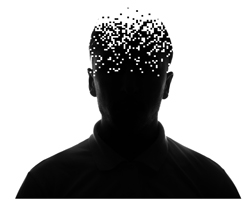Beyond Normal: Alzheimer's Disease
 Dementia is a general term for a decline in mental ability severe enough to interfere with daily life. Memory loss is an example. Alzheimer’s is the most common type of dementia and causes problems with memory, thinking and behavior. Symptoms usually develop slowly and get worse over time, becoming severe enough to interfere with daily tasks. Dementia is a general term for a decline in mental ability severe enough to interfere with daily life. Memory loss is an example. Alzheimer’s is the most common type of dementia and causes problems with memory, thinking and behavior. Symptoms usually develop slowly and get worse over time, becoming severe enough to interfere with daily tasks. 
Alzheimer's is not a normal part of aging and worsens over time. The disease typically progresses slowly in three general stages – mild (early stage), moderate (middle stage) and severe (late stage). Because Alzheimer's affects people in different ways, each person will experience symptoms differently.
A diagnosis of early-stage Alzheimer’s disease doesn’t just affect those with the disease; it affects everyone who loves and cares about them. As a care partner (a term many choose to use rather than “caregiver,” because a person in the early stage of dementia may not need much assistance), you may find yourself in a new and unfamiliar role. You may be unsure of where to go for information, anxious about what to expect as the disease progresses and concerned about your ability to support the person living with dementia.
Take advantage of available treatments, participation in clinical trials and involvement with support groups and other resources. Taking advantage of all these benefits can reduce anxiety about the unknown and lead to better outcomes for everyone involved.
While there is no cure, treatments for symptoms are available and research continues.
Visit alz.org for more information.
 Secrets No One Told You About Family Caregiving Secrets No One Told You About Family Caregiving
|